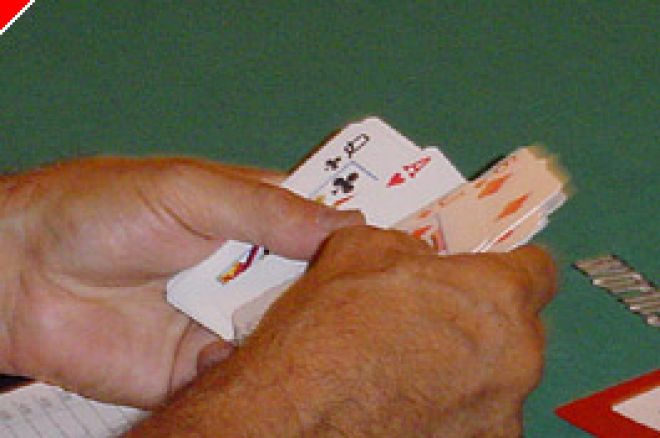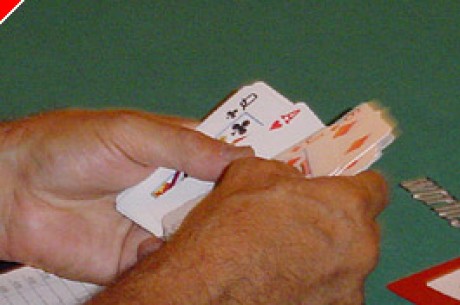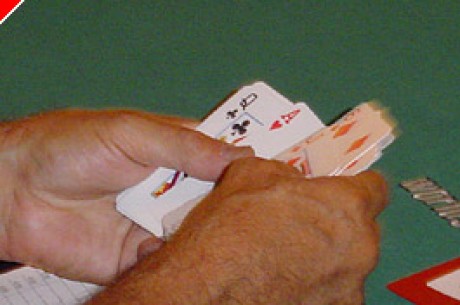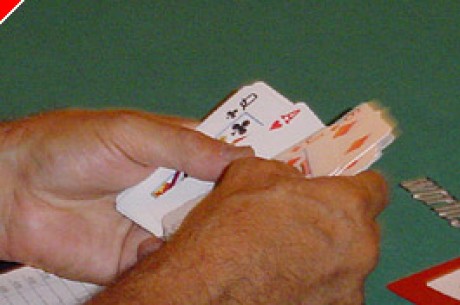Stud Strategy - Arguments at the Poker Table

You've been party to them in poker games. I know I have. These are the battles over rule interpretations that sometimes explode at the table.
Here's one that is worth looking at because it reveals not just a common rule but also a common reaction to it. I was playing in a $20/40 stud game at Foxwoods, my neighborhood poker room. All was well. The game was a nice mix of a few excellent players, a few predictable regulars, and a couple of tourists who really didn't have a clue about proper play. I was making money - which was nice - primarily from one gentleman who had the nice habit of calling me down whenever I bet. The other players at the table had pretty much figured me out as a straightforward tight/aggressive player. But not this guy. He was my ATM.
Fortunately for me, but unfortunately for him, his curiosity seemed to get the better of him. He just couldn't resist calling me down to find out what my cards were. At least that was how I interpreted his actions. He'd call all the way to the River, showing a Queen while I showed an Ace and represented at least a pair of Aces. Then, on the River, I'd bet with Aces up and he'd say, typically, "you probably have me beat but I have to know what you have". He'd call; I'd show my hand; he'd tap the table saying "good hand"; I'd rake in the pot. It was almost like clockwork. Nice table.
Then this incident occurred that changed everything. I've actually seen this a few times but never with the personal consequences to me as in this game.
Three players, including this gentleman, were in a hand on Fifth Street. The exposed cards don't matter. Leave it to say that one wily professional and a regular were in a raising war. The third player, this calling station gentleman, was calling along. This continued all the way until the River. The pot was huge. The pro won the hand with a well concealed full house. The regular folded. The calling station gentleman said to the dealer, "I'd like to see his hand." pointing at the regular who had folded.
The regular went ballistic. He started yelling "You can't do that! That's only if you think there's collusion." The gentleman quietly held his ground. He said that he was allowed to see the cards of anyone who was in the hand at the end when the hand was called. He asked the dealer if that was the rule in this poker room. The dealer told him that it was. So once again he said to the dealer that he'd like to see the player's hand. The dealer was about to turn over the regular's hand when the guy started yelling "Don't you do that! I want the floor"! He then started to hurl expletives at the older gentleman - something about his intimate relationship with his mother. The dealer told him to refrain from such speech or he'd be ejected. The older gentleman seemed very upset.
The floor was called and promptly came over. He asked what was going on. The dealer explained what had happened - with the regular interjecting his opinion throughout that the hand should only be exposed if there was a legitimate question about collusion. The floor told the regular to sit down - that any player may ask to see a called hand on the river. The floor instructed the dealer to expose the regular's hand. The dealer did as he was told. He revealed a pathetic hand, two small pair, �� 6s over 3s.
The incident might well have ended there - with the regular accepting the decision, the gentleman staying and playing in his generous style and everyone living happily ever after. But the hands of fate had another idea.
The regular couldn't let the issue go. He sneered at the older guy and told him that he'd ask to see his hand every single time. He said he'd keep it up all night if he had to. As a practical matter he didn't get to do so, however. The older gent, feeling upset at all of the commotion that he had created, and feeling under attack by at least one player at the table, got up and left. He didn't return. The regular, still sneering and steaming, applauded loudly and hurled some final remarks at the guy as he walked to the cashier with his chips.
Here are my thoughts on the matter. The regular was, to an extent, correct. It is true that the poker room rule about allowing players to request that a called hand be exposed is done to ferret out collusion. Players have the right to see if people are raising each other with garbage. Allowing called hands to be exposed, even if they were folded, helps put a lid on that type of cheating - though anyone clever enough to arrange to collude probably is also clever enough to fold on Sixth Street or at the final River bet.
Asking to see called hands can be done excessively. It surely slows the game. And, by revealing the bad play of others it may also discourage bad play in the future - out of fear of embarrassment if nothing else. Good players and serious players rarely make this request for just that reason. And it's often seen as rude and intrusive.
That being said, a rule is a rule. And the rule isn't limited to instances when collusion is suspected. There is no test for motive or anything else. It is always allowed. Anyone in the hand may ask to see any hands participating in the showdown. So the regular was wrong as a matter of rule.
But there's a much more important consideration that demonstrates how wrong the regular really was. What was the impact of the dispute? The regular showed himself not to be a good player because he let his own personal anger get in the way of his poker judgment. By flying off the handle he pushed the fish out of the game. That was clearly a mistake - a very, very costly mistake. Had he just kept his mouth shut, or dealt with his displeasure in a more temperate way, he might well have kept a good source of profit at the table for a while longer. And that should be one of the major goals of any good player.
Ed Note: Poker Stars have our highest rated tournaments, find out why








